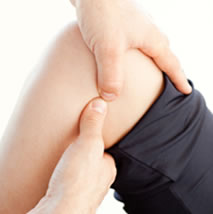CONDITIONS TREATED
Sports injuries
Sports injuries can be any soft tissue or bony injury relating to a sporting activity, this can be something that occurred suddenly or as a gradual build up that may have started off as a small manageable niggle but built up into a painful problem. Many injuries relating to sport can be managed by assessing technique, equipment, training schedules, biomechanics as well as the individuals themselves

Spinal pain
Spinal pain can be felt in any part of your spine, including the neck, thoracic and lower back. It is a large cause of time off work and can cause many individuals to be fearful about moving and returning to work, exercise and their normal lifestyle. A physiotherapy assessment will provide an explanation of the problem and formulate a treatment plan, enabling you to gain the confidence and reassurance to move and regain control back over your lifestyle.
Muscle, tendon and ligament injuries
These injuries can start from any cause. They can include, strains, sprains, tears and tendinopathies. Common conditions that we can help with are frozen shoulder, tennis elbow, Achilles tendinitis and plantar fasciitis. It is all too easy these days to “Dr Google” your symptoms but there is a strong possibility you will get the wrong diagnosis and potentially make the problem worse. You wouldn’t do that with your car so why put yourself at risk? The sooner you seek help from a physiotherapist the sooner you should recover.
Orthopaedic Pre-and post-operative care
This includes surgery for any bone, muscle, tendon, joint and ligament problem. Physiotherapy can help with building up your strength and flexibility prior to and after an operation. For example, we treat patients pre-and post anterior cruciate ligament repair and the same with hip and knee replacements.
Work related and overuse injuries
This can be any soft tissue or bony injury related to repetitive strain/overuse and trauma. Many work related pains are due to poor sitting posture this can manifest itself in any part of the spine as well as referred pain into the upper and lower limbs. Manual jobs can also cause a wide variety of symptoms especially where heavy loads are involved. Some injuries and dysfunctions can be caused by repetitive, smaller fine movements for example in the hand. Your physiotherapist will assess any possible causes by taking account of your background history, this may be work or activity related. They will look at how your body moves in relation to your painful area. A treatment plan can then be formulated.

Arthritis
Arthritis can affect one or many different joints including the spine, this depends on the type of arthritis you may have. This could be osteoarthritis, rheumatoid arthritis as well as some other forms of arthritis. It can be beneficial to see a physiotherapist for an opinion. In some cases, the pain you experience maybe coming from the surrounding soft tissues and not necessarily the joints themselves. Treatment and management options may include, exercise therapy, joint mobilisation, as well as a wide range of other treatment options (see services).
Whiplash
This is an injury usually caused by the head being thrown in different directions (usually forwards and backwards) This can occur through a number of different incidents but is usually associated with vehicle collisions. Whiplash is most commonly felt in the neck but can also cause symptoms in other areas.
Joint problems
These can include any joints such as shoulder, knee, ankle, foot, hand, spine, hip, elbow, fingers. Having joint problems/pain doesn’t necessarily mean you have arthritis. In the majority of cases joint pain can be treated very effectively with physiotherapy. Sometimes you may need to be referred for X-rays/scan to determine the cause of your joint pain.

Posture related problems
A lot of us get into bad habits whether it be at home, work or sport. This in itself can cause strain on tissue and potential damage. This can soon be remedied by seeking the advice form a physiotherapist who will be able to guide you on how to look after your bodies and appropriate exercise classes as necessary.
Pregnancy related pain
In some ladies pregnancy can be uncomfortable and can be the cause of such pain related disorders such as pubic symphysis (Near the pubic bone) and sacroiliac dysfunction (the area where your spine meets your pelvis) and spinal pain. Physiotherapy can help with alleviating discomfort. Pilates can be particularly useful in these circumstances as well as some forms of manual therapy.
 01773 829623 | 07946 325 063
01773 829623 | 07946 325 063  belperphysio@gmail.com
belperphysio@gmail.com 

